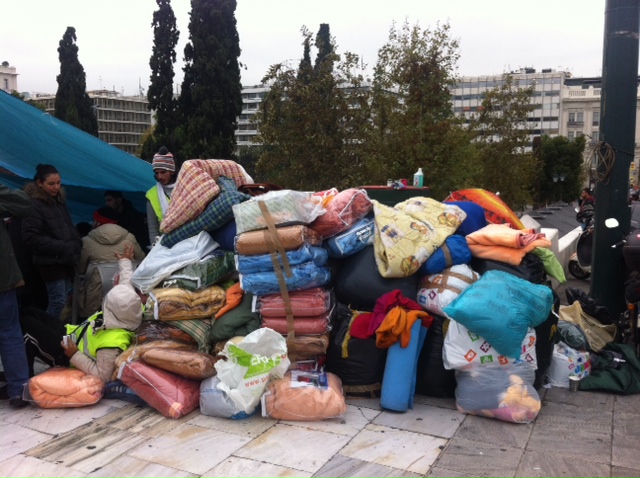The protest of Syrian refugees in front of the Parliament building in Athens is into its 10th day already. On Monday a part of them went on hunger strike; not only adults but a large number of children are still on the pavement despite the cold weather and rain.
What the Syrians request from Greece is to provide them with homes and social support as well as the opportunity to travel to other European countries. However, the Greek law does not stipulate granting social support to refugees, and no opportunities for travel from one European country to another are envisaged for the time being.
A press conference was held today, and, apart from representatives of the refugees, members of various organisations and parties attended it as well. They reiterated the demands of the protesters and declared that pressure on the Greek government was going to mount through holding a mass protest rally next Sunday.

Against this backdrop, GRReporter talked with Giorgos Tsarbopoulos, Head of the Greek Office of the High Commissioner for Refugees. Tsarbopoulos explained that the Syrians’ protest should actually be targeting the European Union and its lack of legal provisions whereby refugees be allowed to travel legally from one European country to another. "They are aware that a refugee status in Greece is something they're going to get pretty fast. Yet from the moment that they figure how difficult it is to find work or receive social support or shelter in Greece, unlike in some other EU member states, they come to the opinion that local refugee status won't give them any future in this country. It does not allow them to travel abroad. This is why their aim is to put across the need for a unified European legal framework, in view of the high numbers of Syrians coming into Greece or Italy. In practical terms, being unable to go anywhere else, they remain stuck in these countries."

Tsarbopoulos believes that European law actually has a directive, which could have addressed this issue. "The directive provides that in the case of a massive influx of refugees they could be granted a status of provisional protection for the whole of Europe. With this kind of solution, the documents issued for refugees in one country will be recognised by all others, and thus refugees will be able to travel between countries. To set this Directive in motion, it is necessary to submit a request on behalf of one member-state, and then take a decision on a ministerial level. Even though this opportunity does exist in theory, it is hard to implement in practical terms. At any rate, this is a political question, which can be considered by any given government."

Another opportunity, which, as Tsarbopoulos believes, is entirely within the competence of the Greek government, is the issuance of ‘refugee passports’ whereby refugees can travel across Europe. "A ministerial level decision can put this into effect, but it is yet to be taken. Indeed, this kind of passport does not allow refugees to live in other countries, but granting them a chance to travel will in itself make a considerable difference for them."
The UNHCR has made the following recommendations to the Greek cabinet on the question of refugees:
- to speed up the passport issuance process and thus ease refugees into a more comfortable regime;
- to introduce integration programmes based on the currently available European funds, to facilitate the refugees’ first steps in Greece;
- to adopt the legal means for the provision of shelter to vulnerable refugee groups; only candidates for refugee status are currently entitled to this kind of provision.
Tsarbopoulos says there are various ways at the European level to allow Syrian or any other refugees to travel legally from countries neighbouring Syria, where most of them are stationed at the moment, to European member states. This can be done through humanitarian visas, training visas, accommodation programmes, measures for reuniting family members, etc. "This is a purely European issue, but Greece is a country, which has an interest in raising it as it is subject to such a strong refugee pressure," he said in conclusion.

At the same time, in statements to Kathimerini, the Secretary General of Population and Social Cohesion at the Interior Ministry, Angelos Syrigos, said that the Syrians in Syntagma Square are completely misguided about the Greek legislation on the granting of refugee status. He pointed out that during his meeting with their representatives, they said they had been informed that only 15 of them were going to receive refugee status while everybody else would be extradited within six months – and this was specified in the document they were given right after they arrived in Greece. As a matter of fact, this deadline will be automatically renewed over the whole period until cessation of hostilities in Syria.
Syrigos also said that a group of five appeared at the meeting casting itself as the protest's coordination committee. They interrupted his explanations on the Greek legal provisions and tried to disband the meeting.